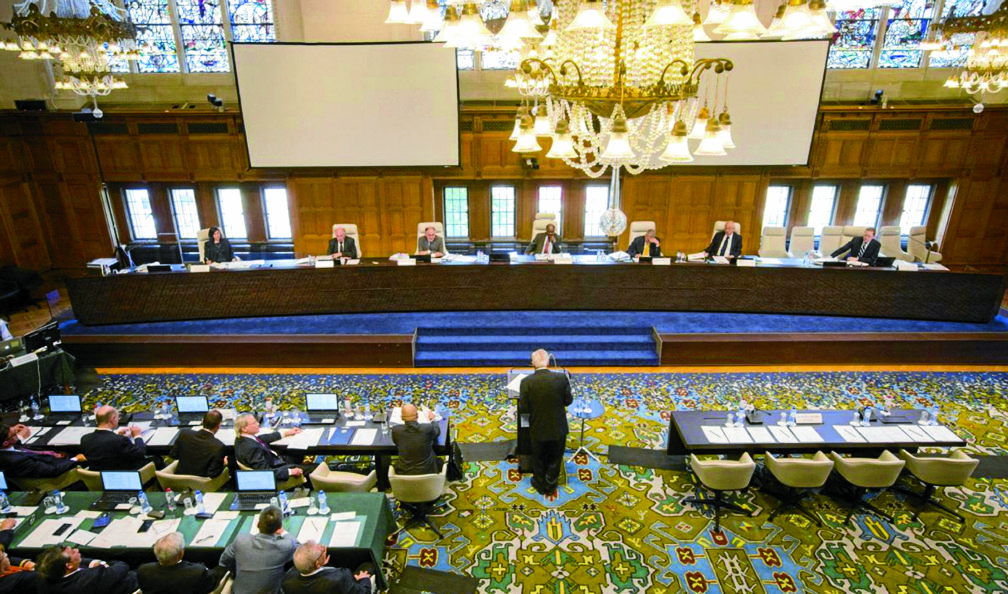
In this July 7, 2015, image provided by the Permanent Court of Arbitration, the case regarding the Philippines and China on the South China Sea is heard at the Permanent Court of Arbitration (PCA) at The Hague, the Netherlands. AP
Following the Philippines’ victory in its arbitration case against China over the disputed South China Sea, a militant group on Wednesday expressed alarm over any future exploration agreements with other nations due to the country’s “bad experience” in the past.
Bayan Muna party-list was particularly referring to the Joint Marine Seismic Undertaking, a 2008 agreement that allowed China and Vietnam to jointly explore with the Philippines oil resources in the country’s claimed territories in the West Philippine Sea.
READ: Philippines wins arbitration case vs China over South China Sea
Zarate urged the Supreme Court to hasten its resolution of the case they filed on the legality of the JMSU, which was entered into by the administration of former President and now Pampanga Rep. Gloria Macapagal-Arroyo.
“While we are for the peaceful resolution of our maritime dispute with China, we must, however, be wary of future joint exploration agreements because of our bad experience with the JMSU, where our country was placed in a very a disadvantageous position when the Arroyo government allowed China an unbridled access in our maritime territory, especially the gathering of valuable data on natural gas deposits in our territories like the Recto Reed Bank,” Zarate said in a statement.
READ: Group seek SC ruling on legality of joint exploration deal inked by Arroyo admin, China
“With the JMSU, the Arroyo administration effectively sold out the country to the Chinese. The Philippines has no more control and supervision over the exploration of our petroleum and other mineral oils under the tripartite agreement; this should not happen again,” he added.
Zarate said a resolution of the JMSU case was crucial now more than ever, ahead of possible bilateral and multilateral talks between the Philippines, China, and other claimant countries in the disputed South China Sea.
READ: SC urged to rule on exploration agreement with China, Vietnam
Zarate lamented that JMSU paved the way for China to discover and become “very zealous in taking over” the natural gas deposits in the Recto Reed Bank as shown by its aggressive stance in the area.
“Any future joint exploration with China must protect the interest of the Filipino people and should contribute to the country’s economic development. It must also recognize our territorial integrity and sovereignty over the area now rightfully ruled as ours. There must be no repeat of the highly unequal JMSU,” he added.
READ: Duterte open to talks with China, joint exploration at disputed sea | Yasay: We have to talk to China
The Permanent Court of Arbitration on Tuesday released its 501-page decision on the arbitration case the Philippines filed in 2013, which concluded that “there was no legal basis for China to claim historic rights to resources within the sea areas falling within the ‘nine-dash line.’”
Days before the release of the decision, Foreign Affairs Secretary Perfecto Yasay was quoted by an international news agency as saying that the Philippine government was keen on a joint exploration of the resource-rich South China Sea even if it wins its arbitration case against China.
READ: Yasay clarifies stand on ‘sharing South China Sea’
Yasay later clarified that what meant was “we have to wait for the ruling and study and dissect its implications.”
“As the ruling will not address sovereignty and delimitation, it is possible that some time in the future, claimant countries might consider entering into arrangements such as joint exploration and utilization of resources in disputed areas that do not prejudice the parties’ claims and delimitation of boundaries in accordance with Unclos (United Nations Convention on the Law of the Sea),” Yasay said in a statement.
RELATED VIDEOS